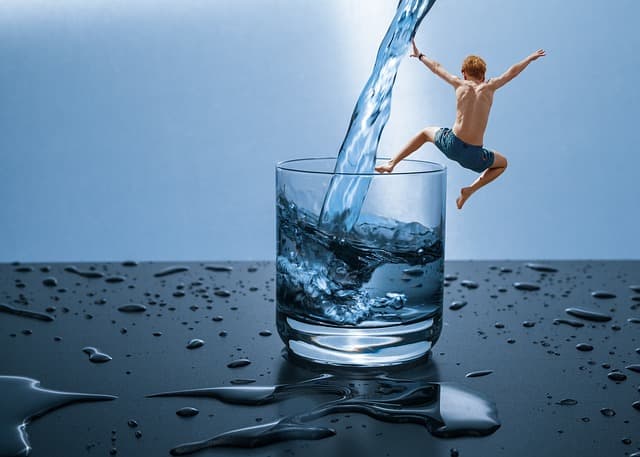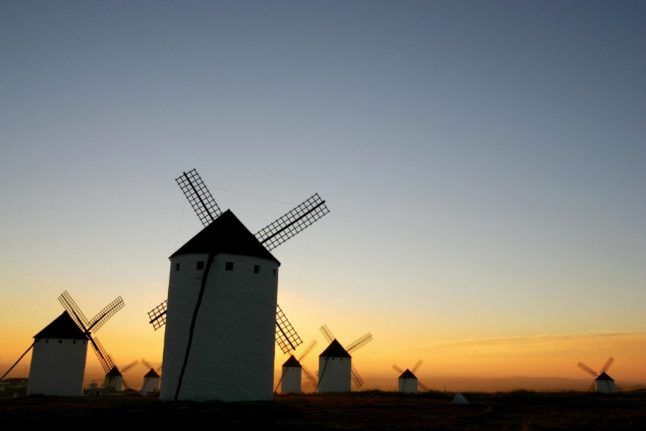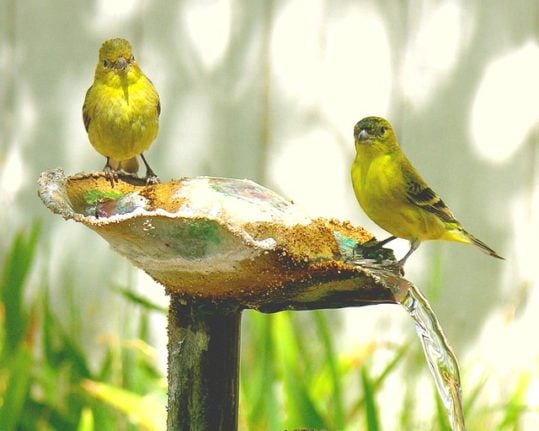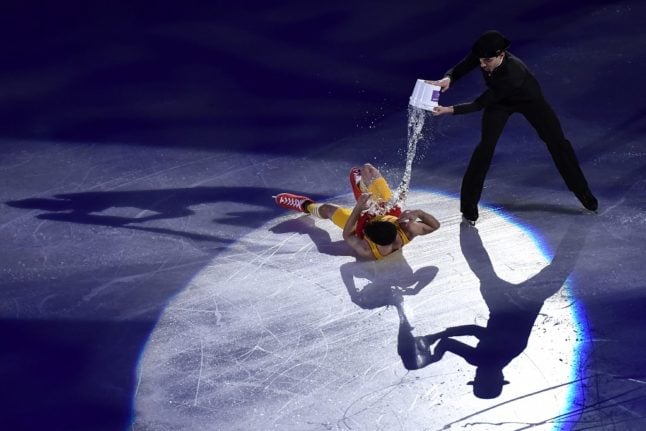Speak like a local: Ten very useful Spanish expressions with the word ‘water’

In hot and sunny Spain, ‘agua’ is certainly a word you need to know. But there are also many handy expressions which include the word for water, from the Spanish version of being 'in dire straits' to what you call a 'party pooper'.
One of the first words Spanish language learners learn is agua, water in Spanish.
As a verb, aguar can mean to water down or spoil, as an adjective - aguado - it can describe something as weak or lifeless.
The list of words derived from the word for water in Spanish is in fact pretty long: acuático, acueducto, acuífero, acuoso, aguacero, aguada, aguado, aguador, aguafuerte, aguaje, aguamanil, aguamiel, aguar, aguardiente, aguarrás, aguasal, aguazal, desaguar, enjuagar, paraguas, piragua etc
But on this occasion we’re going to focus on ten daily use expressions which contain the word agua but don’t necessarily have anything to do with H2O.
What they will do is help you take your Spanish proficiency up a notch, so here goes!
Ahogarse en un vaso de agua: To make a mountain out of a molehill
Literally meaning to drown in a glass of water, it’s the way Spanish speakers say someone is getting frustrated over something that isn’t serious.
Example: Te estás ahogando en un vaso de agua, no es para tanto!
You’re making a mountain out of a molehill, it’s not that bad!
Nunca digas ‘de este agua no beberé’: never say never
This expression translates directly as never say ‘from this water I will never drink’, which is a slightly more poetic version that English’s ‘never say never’ when it comes to never ruling something out.
Example: Eres muy joven, nunca digas ‘este agua no beberé’.
You're very young, never say never.

Photo: Gundula Vogel/Pixabay
Como dos gotas de agua: Like two drops of water
This one is exactly the same as in English, but don’t try to apply the same direct translation to ‘like two peas in a pod’ as you might get some weird looks from Spanish speakers.
Example: Son como dos gotas de agua, tal para cual.
They’re like two drops of water, they’re made for each other.
Agua pasada: It’s water under the bridge
Spanish speakers don’t mention the bridge but they do say that ‘the water has passed’ to signify that something is in the past and forgotten.
Example: El mal rollo entre yo y Juan es agua pasada.
The bad vibes between Juan and I are water under the bridge.

Photo: Pierre Philippe Marcou/AFP
Agua pasada, no mueve el molino: It’s no use crying over spilled milk
This Spanish expression is slightly different from the previous ‘water under the bridge’ as ‘agua pasada no mueve el molino’ (water that has passed doesn’t move the mill) signifies that you can’t change anything about something that’s in the past.
Example: Tienes que superarlo. Agua pasada, no mueve molino.
You need to get over it. There's no use crying over spilled milk.
Estar con el agua al cuello: To be in dire straits
It means to have the water up to your neck, similar to saying that you’re up to your neck in something to imply that you’re going through difficult times - financially or otherwise - and that the situation is very hectic and panicked.
Example: Estoy con el agua al cuello, no se si voy a llegar a final de mes.
I’m in dire straits, I’m not sure I’m going to make it to the end of the month.
¡Agüita! - Gosh/wow
Here’s an interjection that’s used primarily in Spain’s Canary Islands and some Spanish speaking countries in Latin America. You exclaim ¡agüita! (little water) to express surprise or shock about something.
Example: ¡Agüita! Hace tanto calor que no hay nadie en la calle.
Wow! It’s so hot that there’s nobody in the streets.

Photo: Sindi Short/Pixabay
Cambiarle el agua al canario/a las aceitunas: to spend a penny (urinate)
This comical way of saying you’re going to the toilet for a number one - literally translated as ‘changing the canary’s water’ or ‘changing the olives’ water - is a less graphic way of saying ‘voy a mear’, ‘I’m going to pee’.
Example: ¡No aguanto más! Voy a cambiarle el agua al canario.
I can’t hold it in any longer. I’m going to spend a penny.
Como pez en el agua: Like a duck to water
If someone takes naturally to something, instead of referring to them as being like a duck to water, in Spanish it’s a fish in water that’s used as a metaphor.
Example: María se ha adaptado muy bien a su nuevo puesto de trabajo, le va como pez en el agua.
María has adapted really well to her new job, like a duck to water.

Photo: Aris Messinis/AFP
Aguafiestas: party pooper, killjoy
Although this is an adjective rather than actual expression, we thought it was worth including in this list for its originality - literally meaning ‘water party’ - and because it comes up very often in daily conversation in Spain.
The act of spoiling a party by pouring water over revellers was even used by one of Spain’s greatest writers Miguel de Cervantes in his 1613 novel La ilustre fregona, so remember that a spoilsport or buzzkill in Spanish is referred to as an aguafiestas.
Example: No seas un aguafiestas, nos lo estamos pasando muy bien.
Don’t be a party pooper, we’re having a great time.
Comments
See Also
One of the first words Spanish language learners learn is agua, water in Spanish.
As a verb, aguar can mean to water down or spoil, as an adjective - aguado - it can describe something as weak or lifeless.
The list of words derived from the word for water in Spanish is in fact pretty long: acuático, acueducto, acuífero, acuoso, aguacero, aguada, aguado, aguador, aguafuerte, aguaje, aguamanil, aguamiel, aguar, aguardiente, aguarrás, aguasal, aguazal, desaguar, enjuagar, paraguas, piragua etc
But on this occasion we’re going to focus on ten daily use expressions which contain the word agua but don’t necessarily have anything to do with H2O.
What they will do is help you take your Spanish proficiency up a notch, so here goes!
Ahogarse en un vaso de agua: To make a mountain out of a molehill
Literally meaning to drown in a glass of water, it’s the way Spanish speakers say someone is getting frustrated over something that isn’t serious.
Example: Te estás ahogando en un vaso de agua, no es para tanto!
You’re making a mountain out of a molehill, it’s not that bad!
Nunca digas ‘de este agua no beberé’: never say never
This expression translates directly as never say ‘from this water I will never drink’, which is a slightly more poetic version that English’s ‘never say never’ when it comes to never ruling something out.
Example: Eres muy joven, nunca digas ‘este agua no beberé’.
You're very young, never say never.

Photo: Gundula Vogel/Pixabay
Como dos gotas de agua: Like two drops of water
This one is exactly the same as in English, but don’t try to apply the same direct translation to ‘like two peas in a pod’ as you might get some weird looks from Spanish speakers.
Example: Son como dos gotas de agua, tal para cual.
They’re like two drops of water, they’re made for each other.
Agua pasada: It’s water under the bridge
Spanish speakers don’t mention the bridge but they do say that ‘the water has passed’ to signify that something is in the past and forgotten.
Example: El mal rollo entre yo y Juan es agua pasada.
The bad vibes between Juan and I are water under the bridge.

Photo: Pierre Philippe Marcou/AFP
Agua pasada, no mueve el molino: It’s no use crying over spilled milk
This Spanish expression is slightly different from the previous ‘water under the bridge’ as ‘agua pasada no mueve el molino’ (water that has passed doesn’t move the mill) signifies that you can’t change anything about something that’s in the past.
Example: Tienes que superarlo. Agua pasada, no mueve molino.
You need to get over it. There's no use crying over spilled milk.
Estar con el agua al cuello: To be in dire straits
It means to have the water up to your neck, similar to saying that you’re up to your neck in something to imply that you’re going through difficult times - financially or otherwise - and that the situation is very hectic and panicked.
Example: Estoy con el agua al cuello, no se si voy a llegar a final de mes.
I’m in dire straits, I’m not sure I’m going to make it to the end of the month.
¡Agüita! - Gosh/wow
Here’s an interjection that’s used primarily in Spain’s Canary Islands and some Spanish speaking countries in Latin America. You exclaim ¡agüita! (little water) to express surprise or shock about something.
Example: ¡Agüita! Hace tanto calor que no hay nadie en la calle.
Wow! It’s so hot that there’s nobody in the streets.

Photo: Sindi Short/Pixabay
Cambiarle el agua al canario/a las aceitunas: to spend a penny (urinate)
This comical way of saying you’re going to the toilet for a number one - literally translated as ‘changing the canary’s water’ or ‘changing the olives’ water - is a less graphic way of saying ‘voy a mear’, ‘I’m going to pee’.
Example: ¡No aguanto más! Voy a cambiarle el agua al canario.
I can’t hold it in any longer. I’m going to spend a penny.
Como pez en el agua: Like a duck to water
If someone takes naturally to something, instead of referring to them as being like a duck to water, in Spanish it’s a fish in water that’s used as a metaphor.
Example: María se ha adaptado muy bien a su nuevo puesto de trabajo, le va como pez en el agua.
María has adapted really well to her new job, like a duck to water.

Photo: Aris Messinis/AFP
Aguafiestas: party pooper, killjoy
Although this is an adjective rather than actual expression, we thought it was worth including in this list for its originality - literally meaning ‘water party’ - and because it comes up very often in daily conversation in Spain.
The act of spoiling a party by pouring water over revellers was even used by one of Spain’s greatest writers Miguel de Cervantes in his 1613 novel La ilustre fregona, so remember that a spoilsport or buzzkill in Spanish is referred to as an aguafiestas.
Example: No seas un aguafiestas, nos lo estamos pasando muy bien.
Don’t be a party pooper, we’re having a great time.
Join the conversation in our comments section below. Share your own views and experience and if you have a question or suggestion for our journalists then email us at [email protected].
Please keep comments civil, constructive and on topic – and make sure to read our terms of use before getting involved.
Please log in here to leave a comment.